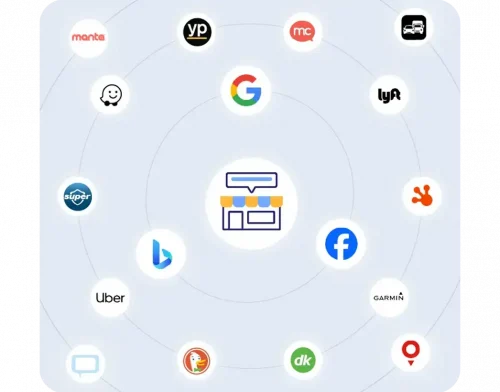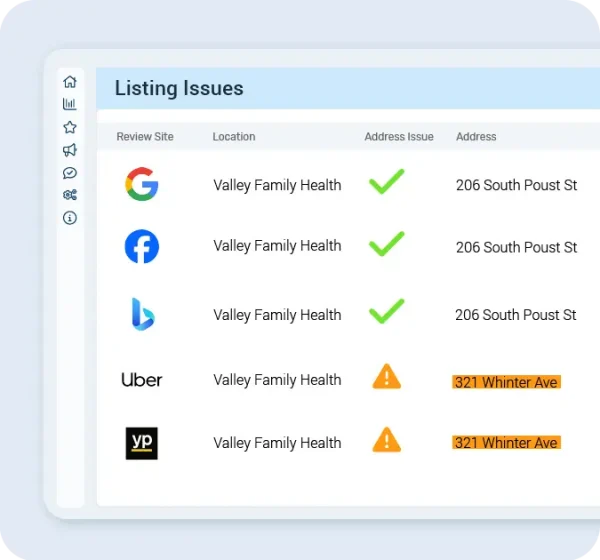
Keeping your business listings accurate and consistent is key to staying visible and attracting local customers. Local searches are one of the top ways customers discover businesses. Local business listings management helps your information remain accurate and consistent across platforms like Google, Apple, Bing, and Facebook. This guide will walk you through the importance of managing your local business listings, the challenges you may face, and the best solutions to boost your search rankings and customer visibility.
In This Guide
What is Local Business Listing Management?
A local listing is an online profile showcasing your business’s location, making it easy for customers to find and contact you. It typically includes essential details like your business name, address, phone number (NAP), and hours of operation.
Local listing management involves adding and maintaining this business information across top directories like Google, Bing, Facebook, and Apple Maps. Consistency and accuracy across your listings are crucial for improving visibility, helping your business appear in “near me” searches, voice assistants like Siri and Alexa, and popular navigation apps. Local listings are vital for businesses serving a local audience, whether you have a physical storefront (like retail shops and medical practices) or offer services within specific areas (like plumbing, real estate, or consulting).
Why Local Business Listings Matter
When customers search for a business “near me,” they rely on the accuracy of business listings to decide where to go. From phone numbers to hours of operation, every piece of information should be accurate and up-to-date across platforms to avoid confusion and loss of customers. Inconsistent or outdated information can reduce trust, harm search rankings, and lead to missed opportunities.
Here’s why managing local business listings is critical:
- Improved Local SEO: Accurate and consistent listings enhance your chances of ranking higher in local search results. Search engines prioritize businesses with verified, consistent data across multiple platforms.
- Visibility Across Devices: Local listings improve how easily customers find your business when searching for services, whether through desktop search, mobile, or voice assistants like Siri, Alexa, and navigation systems.
- Increased Customer Trust: Customers expect consistency. Having different information on different platforms can erode trust and lead to customer confusion and dissatisfaction. For example, if a customer arrives to find your business closed because your online hours are wrong, they may not return.
Common Challenges in Managing Local Business Listings
Managing your business listings can be overwhelming, especially if you’re present on several directories. The most common challenges include:
- Inconsistent Information: Updating information manually can result in errors—such as incorrect business names, addresses, or phone numbers (NAP). This creates confusion and damages your credibility.
- Multiple Platforms: Keeping your listings up-to-date across numerous platforms (Google, Facebook, Apple Maps, Bing, etc.) is time-consuming and often prone to errors.
- Duplicate Listings: Multiple or outdated listings can confuse customers and negatively impact your SEO rankings.
These challenges make it vital to have an automated system that ensures your business information is consistent across platforms without requiring endless manual updates.
Prioritize High-Impact Listing Sites
You don’t need to be listed on every review site or directory. When managing your local business listings, focus on the high-traffic platforms that will have the biggest impact on your visibility. Major sites like Google, Bing, Apple Maps, and Facebook get the most user traffic and play a key role in boosting your local search presence. You can maximize your results by prioritizing these influential directories without spreading your efforts too thin.
Google Business Profile
Your Google Business Profile (GBP) is a critical asset for local SEO. Start by claiming your profile if you haven’t already. Then, make sure your profile is complete and up-to-date:
- Update Your Information: Include accurate details like your address, contact info, business hours, and holiday hours. Incorrect information can frustrate customers and harm your reputation.
- Verify Your Profile: Verified businesses are more likely to be trusted by customers. Verify your Google Business Profile to increase your credibility.
- Use Keywords: Incorporate relevant keywords into your business description. While this won’t guarantee higher rankings, it can help when combined with other local SEO practices.
Apple Business and Bing Listings
Don’t forget about other major platforms like Apple Business and Bing, which play a crucial role in local search visibility.
Apple Business:
- Claim your business listing through Apple Business Connect. Ensure your details are accurate, and add high-quality photos.
- Many Apple users rely on Siri and Apple Maps for local searches, so keeping your listing current helps you reach these customers effectively.
Bing Places for Business:
- Visit Bing Places for Business to claim your listing. If you’ve already set up your Google Business Profile, you can import your information to save time.
- Keep your information accurate and use relevant keywords to help improve visibility on Microsoft devices and search engines.
Industry-Specific Directories
In addition to Google, Facebook, Apple Maps, and Bing, claim and update your business profiles on top industry-specific sites, such as Angi for home services, Healthgrades for medical practices, and DealerRater for automotive businesses. These specialized directories cater to niche audiences and can help increase visibility within targeted markets, ensuring potential customers can find accurate and up-to-date information about your business.

The Importance of Automation in Listing Management
An automated solution is one of the most efficient ways to manage your listings. Automation saves time, reduces errors, and ensures that your business information stays synchronized across all platforms. A good listing management solution will offer features like:
- Comprehensive Profile Updates: Changes to your business information are quickly reflected across major platforms, reducing the risk of outdated details appearing online.
- Centralized Management: A centralized platform allows you to manage all your listings in one place, so you no longer need to log into each directory separately.
- Monitoring & Reporting: Keep your listings accurate and up-to-date across platforms while identifying potential issues that need attention.
Avoiding Duplicate Listings and Boosting Search Rankings
Duplicate listings can confuse customers and search engines. A good listing management solution will help detect duplicates, keep your listings consistent, and ensure your business shows up consistently in search results. This improves the customer experience and helps avoid penalties from search engines that prioritize businesses with clean, verified information.
Backlinks also play an important role. When your business information is correctly linked from authoritative sources, it can help boost your local search rankings, improving your online presence and credibility.
Local Business Listings in Action: Real-World Examples
Outdated Listings:
If your business has ever changed its location, phone number, or hours, outdated listings may still be lingering online, causing customer confusion. Old profiles and incorrect information can damage your credibility and hurt your search rankings.
Managing Multiple Locations:
For a business owner with several locations, like a restaurant, keeping information up to date can be challenging, especially when hours or phone numbers change. Instead of manually updating each listing, a centralized system allows updates all at once, sending correct information to platforms like Google, Facebook, and Bing. This keeps customers informed and helps the restaurant appear in “near me” searches, reducing frustration and missed opportunities.
Updating Business Hours:
Consider a spa planning to update its holiday hours. By scheduling changes in advance through the same system, the spa can display accurate hours across platforms, helping clients plan their visits without any surprises.
The Role of Profile Strength in Business Listings
Profile strength measures how complete and detailed your business listings are, impacting how confidently search platforms can display your information. Your profile strength increases when you include essential details like service descriptions, photos, and hours of operation—helping your business stand out in search results. Building an accurate, comprehensive profile increases the chances that customers can easily find and trust your business online.
How Business Listings Affect Customer Experience
Accurate listings help customers easily contact or visit your business without frustration. Here’s how local listings management improves the overall customer experience:
- Easier Access: Accurate hours of operation, phone numbers, and addresses make it easy for customers to find and contact your business.
- Keep Customers Informed: With timely updates, your business can reflect operational changes, such as holiday hours or payment and accessibility options, helping set clear customer expectations.
- Increased Customer Trust: Accurate profile information builds customer trust and loyalty toward your brand.
Simplify Listings Management
Easily manage your listings, keep your information accurate & boost search visibility.
Gaining a Competitive Edge
ReviewInc’s local business listing management platform offers a streamlined solution for businesses handling multiple locations or directories. Our comprehensive tools keep your business information accurate and up-to-date, helping maintain visibility and build trust across platforms. Key features include:
- Synchronization: Publish your business details to top platforms like Google, Apple, Bing, and Facebook, key directories, voice assistants like Siri and Alexa, and navigation systems.
- Listing Health Check: Monitor your listings for outdated or incorrect information, fixing issues before they affect your visibility.
- Bulk Listing Management: Businesses with multiple locations can manage updates in bulk, saving time and ensuring consistency across all platforms.
- Ongoing Verification: Listings are re-verified to ensure that your information remains current and correct.
- Listing Protection: With an active subscription, ReviewInc’s platform adds an extra layer of security to your business listings. By regularly verifying ownership, we make it more difficult for others to claim or alter your listings without authorization, helping you maintain control and protect your brand identity across platforms.
Managing your business listings shouldn’t be a burden. If you’re looking for a solution to keep your business visible and optimized for local search, it’s time to explore how ReviewInc can help. Whether you want to start with a demo or learn more about our business listing services, we’re here to guide you every step of the way.
Common Questions about Managing Local Business Listings
What is local business listing management and why is it important?
Local business listing management involves keeping your business information—like name, address, and phone number (known as NAP) as well as hours of operation—accurate across major platforms such as Google, Apple Maps, Facebook, Bing, and local directories. This process plays a vital role in improving local SEO, making it easier for potential customers to find your business.
Accurate listings help your business appear in “near me” searches, increase visibility on voice assistants like Siri and Alexa, and boost your presence on popular navigation apps. Keeping your listings up-to-date builds trust with customers and can drive more traffic to your business.
How does accurate listing data impact my SEO performance?
Consistent business listings across platforms are crucial for local search engine optimization (SEO). When your data is correct, search engines rank your business higher, improving visibility and driving more traffic to your location.
Do I need to be listed on every review site and directory?
You don’t need to be listed on every review site or directory, but it’s important to focus on high-traffic platforms like Google, Bing, Apple, and Facebook. These sites are key for visibility. Additionally, consider mobile-friendly listings, as many users access directories on mobile devices. Many directories share data, so being listed on key platforms can extend your reach across a broader network.
What’s the difference between a data aggregator and a business directory?
Data aggregators distribute your business information to multiple online directories automatically, helping keep your details consistent across a wide range of platforms. However, no single aggregator covers all the important sites for your business.
Business directories are specific websites where your business listing appears directly, such as Google Business Profile, Facebook, Bing Places, Apple Maps. Potential customers often visit these sites to find specific services, making them crucial for visibility.
A comprehensive local business listing management solution uses both data aggregators and direct updates to business directories. This approach helps you extend your reach, maintain accurate listings, and improve your visibility across the platforms that matter most.
How do backlinks from from local business listings Improve SEO?
Backlinks are links from other websites pointing to your business’s website. High-quality backlinks, especially from trusted listings on platforms, play a key role in improving search engine rankings. When your website is included in authoritative local listings, like Google Business Profile and Bing Places, it can create valuable backlinks or citations that signal credibility to search engines. This strengthens your website’s authority, enhances your visibility in search results, and drives more traffic to your business.
What does NAP mean in listings?
In listings management, NAP stands for Name, Address, and Phone number. These are the core details that appear in online business listings and are essential for ensuring consistency across platforms. Accurate NAP information helps improve search visibility, builds trust with customers, and ensures that people can easily find and contact your business.








